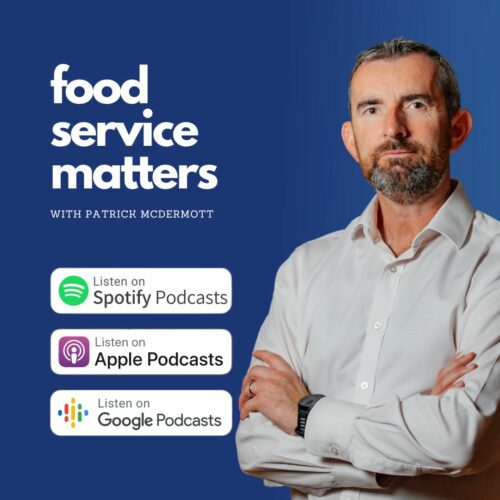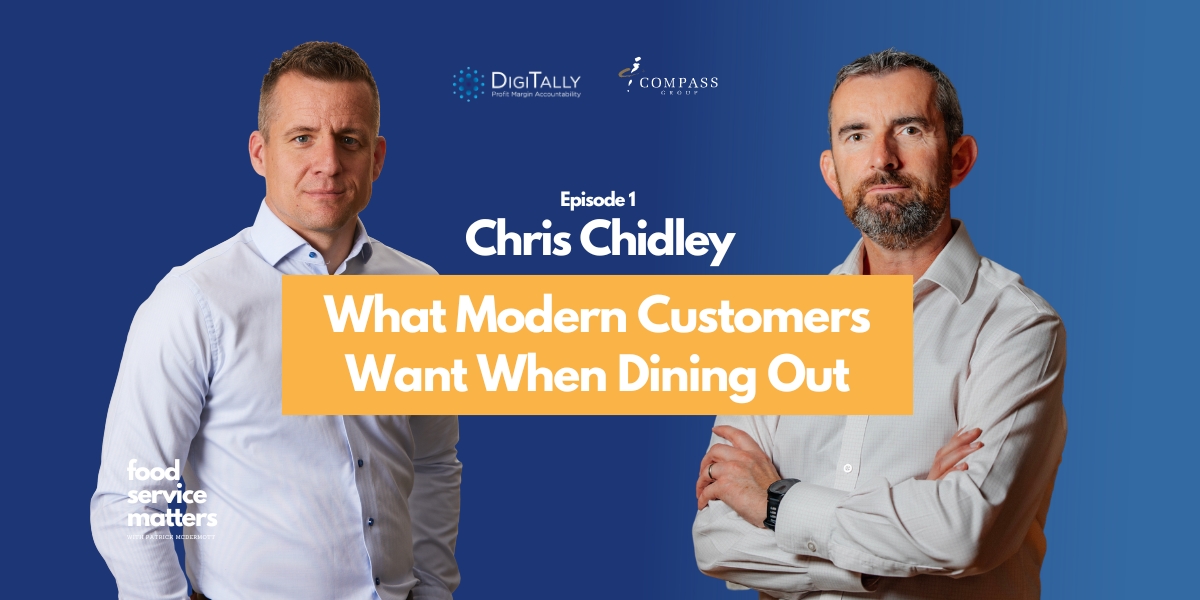Give the customer what they want. But what is that when what they want has changed altogether?
The food service industry has always evolved to meet the changing needs and expectations of consumers. But as we settle into post-COVID-19 reality, the question is, what are modern customers really looking for when eating out?
Patrick McDermott discusses this with Chris Chidley, Chief Growth Officer of Compass Group, the largest food service company in Europe, in the first episode of the new Food Service Matters podcast.
“What’s the shift?” Patrick asks Chris. “What are the biggest changes in the food services sector, and where is it going in the future?”
The answer, Chris says, is that “quality food is expected as a given. Now, we have to pay attention to sustainable, locally sourced food, and creating a memorable experience.”
Let’s break that down.
Experience is Everything
“Great food is standard!” says Chris. What diners want in addition to superb food and convenience are experiences that are memorable and unique.
Customers want a journey. “Our consumer base is far savvier with their expectations. They’re looking for amazing experiences. Every touchpoint along that journey has got to have some real lasting memories – through to an Instagrammable post or food dish that looks amazing.”
Chris suggests that the social aspect of that journey is essential. “It’s never been more important to have great food that brings people together. As cliché as it sounds, right now, that is exactly what this country needs: to bring people together to converse, to share and to collaborate.”
Sustainability is Success
Customers want to make a positive, responsible contribution with their spending choices. “There is an increased consciousness around food’s sustainability credentials,” says Chris. “These are exciting times. The more we can address the demands of the consumer, the better our industry becomes. The way we look after the planet and our people, locally, is going to become far more prominent.”
Protecting the environment and sourcing food locally are the two sustainability pillars that Chris proposes we must act upon to appeal to the modern customer.
Protecting the Environment
Consumers are increasingly concerned about the environmental impact of their food choices, and they’re looking for ways to support responsible businesses.
“Food contributes almost a third of the greenhouse gases we emit every year across the world,” explains Chris. “We’ve got a huge responsibility to address and reduce the amount of CO2 and get closer to achieving what everyone needs to be doing: saving the planet. That’s got to be balanced with commercial risk, and it’s a journey, but there is some low-hanging fruit (that isn’t air-freighted!) that you can grab to make a big difference. We’ve made some really small changes and reduced our CO2 emissions by 80,000 tons. So, small changes make big differences.”
Sourcing Food Locally
Buying ingredients from local farmers and producers helps reduce the environmental impact of food transportation, and it also supports the local economy.
Chris asks, “Can you re-engineer your products so that they’re more local, as opposed to having the premiums of the distribution network coming from abroad? How does that help local suppliers to grow their own organisations and create jobs? There’s a path that we can go down there.”
He explains his own experience in Compass Group. “Looking after local economies, and the people within them, allows us to move closer to our journey of net zero by 2030. Our contribution to social value is maximised, whilst delighting our consumers with experiences they’re looking for, which is married off with great food.”
Meeting Expectations
And therein lies the secret to pleasing the modern customer. “If all you do is about looking after the planet and looking after people, whilst making sure that consumers are being delighted, then you’ve got the right core values. Find a blend of these elements; then, whatever vision you solidify at a tactical level will work.”
Chris leaves listeners with a recommendation that resonates in current times: “If you listen to what consumers are looking for, you’ll find that competitive edge.”
There may be many challenges in the modern food and beverage industry, but there are also opportunities. By meeting consumers’ expectations and embracing food industry trends, food service providers can create a bright future for their businesses.
To listen to Patrick’s full interview with Chris, check out the Food Service Matters Podcast on Spotify, Apple Podcasts or Google Podcasts.

Patrick is CEO of stocktaking app DigiTally, which is playing an increasingly important role as an intuitive and interconnected stock management system that keeps your food service business up to date and helps combat food waste. Keen to learn more? Let’s chat! Book a 30-minute call with Patrick and get your demo set up today.



